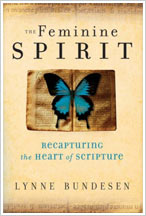The Feminine Spirit
By Lynne Bundesen
Review By Casey Fedde
Categories: Bible Study, Spiritual Living, Women in the Bible Books don't often come with reading instructions. And understanding religious texts can be daunting.
 When reading the Bible, it may feel as if the plot lines are too complex to follow, the themes are too buried to find, and the language is too archaic to understand. (Seriously, instructions not included?!) That's why general readers – and scholars, too – turn to commentaries, literary analyses, and translations. These texts straighten out the convoluted family trees, unpack the many themes, and define the unfamiliar terms. But even with this help, the Bible may still require some extra focus and careful reading (or re-reading). When reading the Bible, it may feel as if the plot lines are too complex to follow, the themes are too buried to find, and the language is too archaic to understand. (Seriously, instructions not included?!) That's why general readers – and scholars, too – turn to commentaries, literary analyses, and translations. These texts straighten out the convoluted family trees, unpack the many themes, and define the unfamiliar terms. But even with this help, the Bible may still require some extra focus and careful reading (or re-reading).
Lynne Bundesen's The Feminine Spirit is a fresh and welcome companion to reading and understanding the Bible. With an extensive background in religion, spirituality, and teaching, Bundesen debunks the male-dominated views of the Bible and rolls away the stone from the stories of Rebekah, Abigail, Sarah, Ruth, Mary, Elisabeth, and others, shedding a balanced, nondenominational light on spirituality and gender roles.
The Feminine Spirit even tells readers how to begin reading. (Yes, this time instructions are included!) The introductory chapters familiarize readers with the structure of The Feminine Spirit and the many translations it uses, and they encourage the use of a Bible concordance, which can really help when confronted with those "pesky 'begats.'" Bundesen reminds readers: "Allow yourself to be alone with the Bible and your own unlimited potential for understanding it." Later on, she says, "[A]s you read, study, put into practice what the Bible has to say to you, then you are building your tabernacle."
What sets The Feminine Spirit apart from other commentaries is its simplicity in sharing the Bible's stories. Unlike Marcus J. Borg and John Dominic Crossan, whose exhaustive commentaries on the last week and the nativity story (link to reviews here) chronicle in great detail the genealogy, context, and parabolic meaning of these specific events, Bundesenintroduces "the feminine spirit" in both the Old and New Testament in a way that elevates the journey – the seeking and finding of comfort, inspiration, and answers – over the words on the page.
In keeping the book simple, though, Bundesen doesn't skimp on facts, and she emphasizes the impact translations can have on meaning. Interestingly, Bundesen writes, "Spirit of God, in the original Hebrew, is ruah Elohim. Ruah, the word meaning 'Spirit,' is a feminine noun." "Church" and "glory" are also feminine nouns in Hebrew, she notes. Bundesen effectively makes her case for seeing the female nature of God in familiar biblical stories, and then shows how this view impacts lives today.
While The Feminine Spirit may be one of many biblical commentaries about women and gender, its gentle reminder of what God has done for women (and men) brings a deeper sense of revelation to each biblical character and creates a constant curiosity to read again and again the inspiration, not mere information, present throughout the Bible – this time with a feminine spirit. |